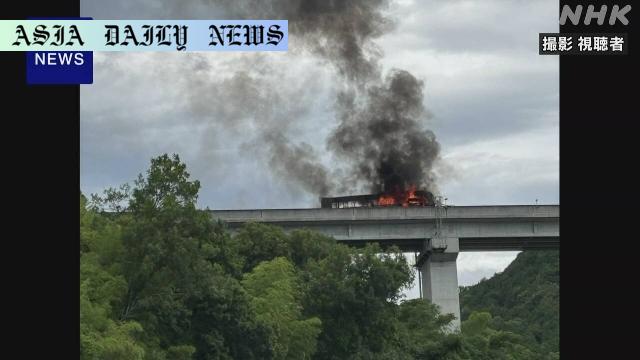Highway Collision: Two people dead after a tragic bus-truck collision on Tokushima Expressway in western Japan, with 12 injured.
- Key Point 1: A head-on collision between a bus and a truck occurred on the Tokushima Expressway in Awa City, western Japan.
- Key Point 2: The crash resulted in two fatalities, including a bus passenger and the truck driver, while 12 others sustained injuries.
- Key Point 3: Police suspect that one of the vehicles veered towards oncoming traffic, causing the accident.
- Key Point 4: Authorities continue to investigate the cause of this tragic incident.

Overview of the Tragic Collision
The Tokushima Expressway in western Japan became the scene of a devastating accident on Monday afternoon. A highway bus and a truck were involved in a head-on collision at around 12:30 p.m. in the Ichiba-cho district of the city of Awa, located in Tokushima Prefecture. This tragic event resulted in two deaths, including a passenger on the bus and the truck driver. Fortunately, 12 people on the bus, including the driver, survived, though they sustained various injuries. The severity of this incident has left authorities and witnesses shaken, emphasizing the critical need for heightened safety measures on roads.
Facts and Initial Investigation
The bus involved in the collision was operated by Iyotetsu Bus and was en route from Matsuyama in Ehime Prefecture to Kobe in Hyogo Prefecture, a path commonly used by many travelers. Police reports indicate that the accident occurred along a narrow, single-lane section of the expressway, where lanes were separated only by poles. Initial investigations suggest that one of the vehicles crossed over into the oncoming lane, leading to the fatal crash. The collision caused both the bus and truck to catch fire rapidly, engulfing the vehicles in flames and leaving limited time for evacuation.
Impact on Victims and the Community
The loss of life and injuries resulting from this collision are a stark reminder of the dangers present on high-speed roads. The passenger killed in the bus and the truck driver were victims of what many describe as a preventable tragedy. Emergency services were quick to respond, rescuing the injured and extinguishing the flames, but the sheer scale of damage has raised concerns about road safety infrastructure and regulations. Communities in Tokushima Prefecture and surrounding areas are mourning the losses while rallying to support the injured victims.
Call for Improved Road Safety Measures
This tragic accident has brought renewed attention to the need for improved safety measures on expressways. Experts have pointed out that sections of the Tokushima Expressway, especially the single-lane stretches with minimal physical barriers, pose significant risks. Authorities must consider implementing stricter regulations or redesigning such sections to prevent future incidents. Technological advancements, such as lane departure warning systems or automated vehicle controls, could also reduce human error affecting road safety. With investigations ongoing, there is hope that policy changes will emerge in response to this incident.
Conclusion
The heartbreaking collision on the Tokushima Expressway serves as a solemn reminder of the unpredictability of road travel and the catastrophic consequences of a momentary lapse in judgment. While investigations by the police continue, it is crucial for transportation authorities, policymakers, and road infrastructure developers to analyze the incident thoroughly and take significant steps to prevent a recurrence. Comprehensive safety policies, along with emerging technologies, can save countless lives and rebuild trust in the safety of the nation’s roadways.



Commentary
The Emotional Impact of Road Tragedies
It is always heartbreaking to hear about a road accident that results in the loss of life. The recent highway bus and truck collision in Tokushima Prefecture is no exception. Two lives were lost, and 12 more people were injured in an event that will likely leave emotional and physical scars on all involved. My thoughts go out to the victims and their families, who now have to cope with this sudden and tragic loss.
The Importance of Learning from Incidents
Beyond the emotional impact, such incidents serve as a wake-up call for society to reflect on road safety standards. Roads like the one on the Tokushima Expressway, where lanes are divided only by poles, should be under strict examination. It is essential to ask whether infrastructure is up to current safety standards and whether simple changes, such as stronger barriers or advanced monitoring technologies, could save lives in the future.
The Role of Human Responsibility
While infrastructure plays a significant role, it is sobering to remember that human error is often the leading cause of accidents. Proper training for commercial vehicle operators and strict enforcement of safety protocols can go a long way in reducing incidents of this nature. Moreover, as technology advances, automated solutions such as lane departure warnings and automatic braking systems should become more widely implemented to compensate for human limitations.
Moving Forward
Ultimately, the goal should be to make this kind of tragedy a rarity. Lives lost on the road are irreplaceable, and each incident is a stark reminder of the fragility of human life. As investigations continue into the Tokushima Expressway collision, I hope decisive actions will be taken to prevent such events in the future. The collective effort of government authorities, engineers, and the public can make a meaningful difference in achieving safer and more reliable transportation systems.